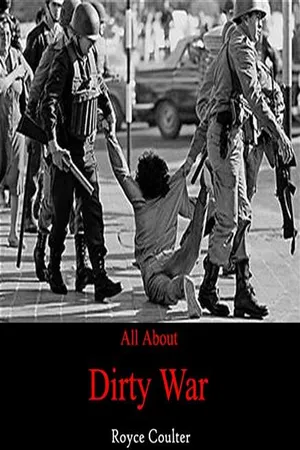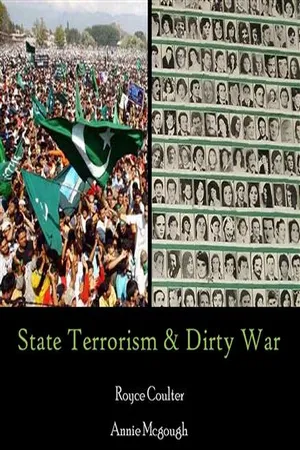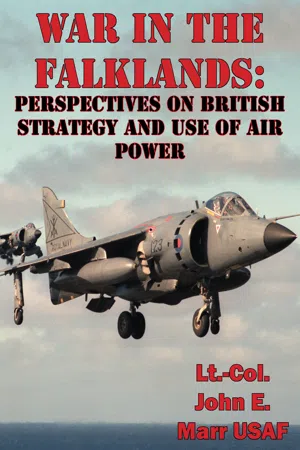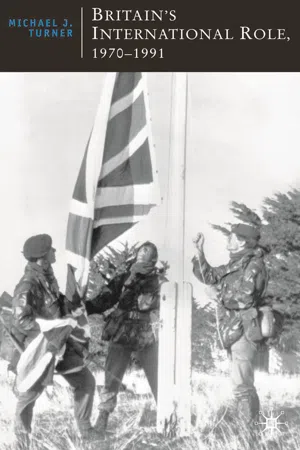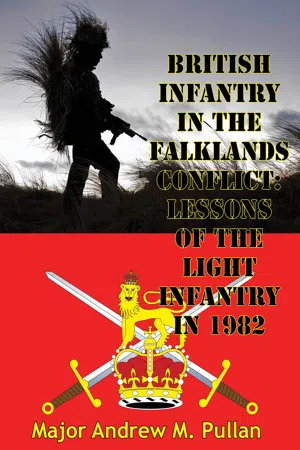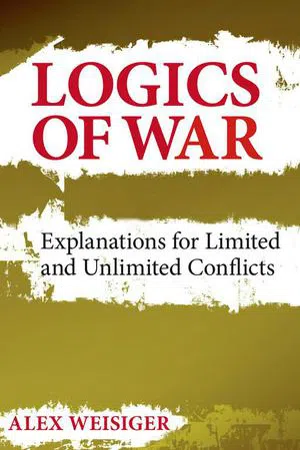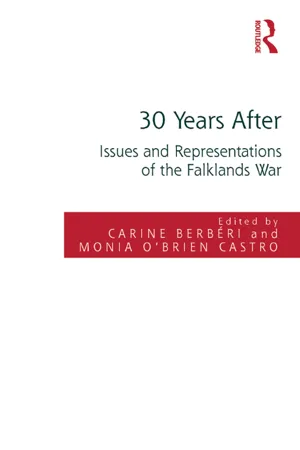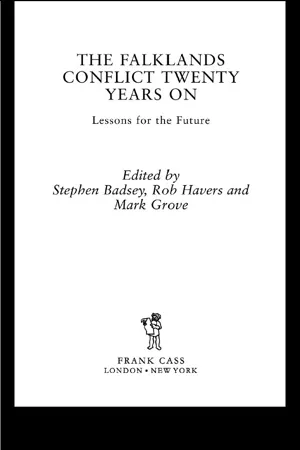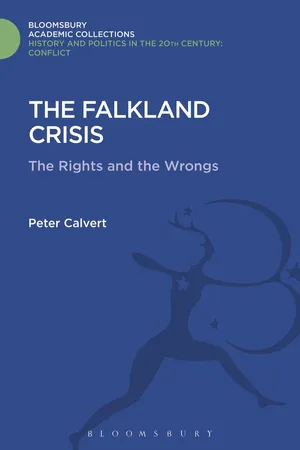History
Falklands War
The Falklands War was a 10-week conflict in 1982 between Argentina and the United Kingdom over the disputed Falkland Islands. Argentina invaded the islands, leading to a military response from the UK. The war resulted in a British victory, with the islands remaining under British control and having a significant impact on both countries' politics and military strategies.
Written by Perlego with AI-assistance
Related key terms
1 of 5
11 Key excerpts on "Falklands War"
- No longer available |Learn more
- (Author)
- 2014(Publication Date)
- Library Press(Publisher)
________________________ WORLD TECHNOLOGIES ________________________ Chapter- 2 Falklands War Clockwise from top left: The sinking of the ARA General Belgrano ; the RFA Sir Tristram ; Argentine prisoners of war; Margaret Thatcher; British cemetery at San Carlos (inset shows satellite image of the Falkland Islands); War memorial in Buenos Aires; Members of the Argentine Third Military Junta; British Royal Marines surrendering at Government House. The Falklands War (Spanish: Guerra de las Malvinas/Guerra del Atlántico Sur ), also called the Falklands Conflict/Crisis , was fought in 1982 between Argentina and the United Kingdom (UK) over the disputed Falkland Islands and South Georgia and the South Sandwich Islands. The Falkland Islands consist of two large and many small ________________________ WORLD TECHNOLOGIES ________________________ islands in the South Atlantic Ocean east of Argentina; their name and sovereignty over them have long been disputed. The Falklands War started on Friday, 2 April 1982, with the Argentine invasion and occupation of the Falkland Islands and South Georgia. Britain launched a naval task force to engage the Argentine Navy and Argentine Air Force, and retake the islands by amp-hibious assault. The conflict ended with the Argentine surrender on 14 June 1982, and the islands remained under British control. The war lasted 74 days. It resulted in the deaths of 257 British and 649 Argentine soldiers, sailors, and airmen, and the deaths of 3 civilian Falklanders. It is the most recent external conflict to be fought by the UK without any allied states and the only external Argentine war since the 1880s. The conflict was the result of a protracted diplomatic confrontation regarding the sove-reignty of the islands. Neither state officially declared war and the fighting was largely limited to the territories under dispute and the South Atlantic. - No longer available |Learn more
- (Author)
- 2014(Publication Date)
- College Publishing House(Publisher)
________________________ WORLD TECHNOLOGIES ________________________ Chapter 7 Falklands War Clockwise from top left: The sinking of the ARA General Belgrano ; the RFA Sir Tristram ; Argentine prisoners of war; Margaret Thatcher; British cemetery at San Carlos (inset shows satellite image of the Falkland Islands); War memorial in Buenos Aires; Members of the Argentine Third Military Junta; British Royal Marines surrendering at Government House. The Falklands War (Spanish: Guerra de las Malvinas/Guerra del Atlántico Sur ), also called the Falklands Conflict/Crisis , was fought in 1982 between Argentina and the United Kingdom (UK) over the disputed Falkland Islands and South Georgia and the ________________________ WORLD TECHNOLOGIES ________________________ South Sandwich Islands. The Falkland Islands consist of two large and many small islands in the South Atlantic Ocean east of Argentina; their name and sovereignty over them have long been disputed. The Falklands War started on Friday, 2 April 1982, with the Argentine invasion and occupation of the Falkland Islands and South Georgia. Britain launched a naval task force to engage the Argentine Navy and Argentine Air Force, and retake the islands by amphibious assault. The conflict ended with the Argentine surrender on 14 June 1982, and the islands remained under British control. The war lasted 74 days. It resulted in the deaths of 257 British and 649 Argentine soldiers, sailors, and airmen, and the deaths of 3 civilian Falklanders. It is the most recent external conflict to be fought by the UK without any allied states and the only external Argentine war since the 1880s. The conflict was the result of a protracted diplomatic confrontation regarding the sovereignty of the islands. Neither state officially declared war and the fighting was largely limited to the territories under dispute and the South Atlantic. - Lt.-Col. John E. Marr USAF(Author)
- 2015(Publication Date)
- Tannenberg Publishing(Publisher)
CHAPTER II — WAR AS AN EXTENSION OF POLITICS
The Falklands conflict illustrates as well as any in the past few decades that war is, as Clausewitz says, “…a continuation of political intercourse, carried on with other means.” (7:87) To understand the Falklands War you must have an appreciation of the climate which lead to the shift from diplomatic to violent means in resolving this political conflict. To gain this appreciation, the policies of both nations have to be examined in their domestic and international contexts. In the end, it will be clear that the war was not Inevitable, but was caused largely by mutual misconceptions and miscalculations regarding each other's intentions and capabilities. (37:52; 22:100; 24:9)Britain's Decline as a Global Power
Great Britain's role as a world power changed dramatically after World War II. A new bipolar world order emerged, led by the United States and the Soviet Union. Although England was victorious in the war, its economy was severely ravaged and it was no longer in a position to maintain its previous role as a leading world power. (16:62) In spite of this, Britain still attempted to maintain the commitments of its global empire. This was complicated by its new responsibility to provide occupation forces on the Continent. (16:62) Slowly, and with great pain, Britain came to realize and accept the decline of the empire. (16:63)British foreign and defense policies began a shift which refocused on the defense of Europe, through the North Atlantic Treaty Organization (NATO), and a reliance on nuclear weapons as a deterrent force. (16:65) At the same time, Britain began the unpleasant process of untying itself from its colonial commitments, best demonstrated by its withdrawal from “East of Suez.” (16:65) Britain's ability to maintain colonial influence was exacerbated by its slow economic recovery, driven in part by its inability to gain membership in the European Community until 1970. (16:65) Throughout the 1970s, the British continued to concentrate on their NAT commitments, which emphasized defense in the East and North Atlantic, defense of England itself, maintaining the British Army on the Rhine (BOAR), providing its own nuclear capabilities, and basing for US nuclear assets. (16:66) The manner in which Britain transitioned from its global and colonial role was less than graceful and far from efficient. One expert comments:- eBook - PDF
- Michael J Turner(Author)
- 2010(Publication Date)
- Bloomsbury Academic(Publisher)
198 10 The Falklands Crisis: Causes and Consequences For Britain the 1970s and 1980s represent a period of adjustment to changed circumstances in which British influence in the world was limited. A continuous effort was required to bring commit- ments into line with resources. It would be wrong, however, to characterize this period only in terms of retreat. After Britain’s victory over Argentina in the Falklands War, Thatcher declared that things had changed and that ‘Britain is great again’. She was exaggerating. By dismissing the preceding decades as years of fail- ure and weakness, she was affirming that her own time in office should be seen in a different light. But the Falklands campaign was not a renewed attempt to restore Britain to its former world role. Although Britain went to war over the Falklands and committed itself to the defence of the islands, the usual practice was to limit obligations. Lack of resources had long since brought an end to the ‘global system’. The Falklands crisis was an isolated example. Britain generally preferred peaceful withdrawal, as with Rhodesia and Hong Kong. 1 If the Falklands War was not an attempt to revive empire or recreate a world role, what was it? In truth, the war was an accident. It was unintended. Nevertheless, Thatcher had a point when she spoke of British greatness, in that the war was a sign that Britain could still act like a great power, even if this greatness was based on much reduced economic and military foundations. The war rekindled memories of British courage and determination in times of trial and showed that these strengths were still present. Despite the compromises of the 1970s and 1980s, there were things that Britain would not tolerate, fundamental interests that would not be given up and principles on which Britain would make a stand, whatever the costs and drawbacks. The Falklands crisis also reveals something about Britain’s relative decline as a world power during the twentieth century. - Major Andrew M. Pullan(Author)
- 2014(Publication Date)
- Tannenberg Publishing(Publisher)
Britain started to settle the islands and formally declared a colonial administration in 1842 (see fig. 4). In 1908, Britain declared sovereignty over the uninhabited territory south of the Falklands, thus creating the Falkland Islands Dependencies, which included South Georgia and the South Sandwich Islands.Figure 4: History of the Falkland IslandsArgentina continued to pursue her claim to the islands. In 1965, after a period of intense Argentinean lobbying, the United Nations passed Resolution 2065 specifying that the Falklands/Malvinas was a colonial problem and thus it fell to Britain and Argentina to find a peaceful solution. Talks continued off and on for the next seventeen years without satisfactory resolution. Britain argued that its right to ownership rested on her peaceful and continuous possession of the islands over a long period of time and upon the Islanders’ right of self-determination. In 1980 the Islanders and Argentina rejected the one remaining solution of lease-back and shared responsibility.The Argentinean decision to invade the Falklands was made in 1982 by a military junta that faced growing political and internal unrest and a call for a return to democracy. Capturing the Malvinas proved an irresistible way of stifling, in part, internal dissent and a means of uniting the country. Additionally, If the Falklands Islands were brought under Argentinean control by force of arms then it would also serve as a vindication of military rule.Annotated Chronology of the 1982 Conflict
The following is an annotated chronology of the key events of the Falklands Campaign. Limited space precludes a more detailed description. The dates and events recorded are taken from a British perspective.2 April. Argentina launched Operation Azul (Blue), the invasion of the Falklands Islands.{13} At 9:25 A.M. Governor Hunt ordered the sixty-nine Royal Marines based on East Falklands to surrender to the invading force of approximately one thousand Argentinean marines and special forces supported by the Argentinean fleet.{14}- eBook - PDF
Pink Ice
Britain and the South Atlantic Empire
- Klaus Dodds(Author)
- 2002(Publication Date)
- I.B. Tauris(Publisher)
The ‘Falklands factor’ was to become a byword for political determination, national prowess and a resurgence of British national identity. As with Argentina, the Falklands now occupy for many in Britain a similar mythical position within the collective imagination. It demonstrated that although Britain was living in post-colonial times, a ‘new era of colonial permanence has already begun, its arrival heralded by Britain’s victory in the 1982 Falklands War’. 8 With Thatcher at the helm, no-one in the FCO dared to voice any change to the status of the Falkland Islands. The conflict continues to be commem-orated in the Falklands and Britain, and with the passing of time some of the controversies relating to the burial of the British fallen and the initial reactions of the relatives to the bleak and inhospitable landscapes of the Falkland Islands have receded. F I G H T I N G F O R T H E FA L K L A N D S — 165 THE FALKLANDS FACTOR: TRANSFORMING ISLANDS On 3 April 1982, the first Saturday sitting of Parliament since the 1956 Suez Crisis, MPs gathered to hear the news that Argentine forces had indeed occupied the Falkland Islands and South Georgia. The Governor of the Falkland Islands, Rex Hunt, had been deposed and Argentine forces now occupied Government House in Stanley. As Thatcher noted, I must tell the House that the Falkland Islands and their dependencies remain British territory. No aggression and no invasion can alter that simple fact. It is the Government’s objective to see that the Islands are freed from occupation and are returned to British administration at the earliest possible moment. The people of the Falkland Islands, like the people of the United Kingdom are an island race … They are few in number, but they have a right to live in peace, to choose their own way of life and to determine their own allegiance. Their way of life is British: their allegiance is to the Crown. - Alex Weisiger(Author)
- 2013(Publication Date)
- Cornell University Press(Publisher)
While it would be incorrect to ignore domestic politics, a closer look demonstrates that a purely domestic political explanation for the war would be woefully incomplete. The Argentines were willing to invade in large part because they underestimated British resolve and capability; thus, divergent expectations about the consequences of the use of force played a significant role in bringing about the conflict. Moreover, although temporarily successful, the diversionary strategy quickly backfired when the war went poorly for the Argentines. This case is thus consistent with the prediction that diversionary wars will typically be short.History of the Conflict
The islands in question—known as the Falklands to the British and the Malvinas to the Argentines—lie several hundred miles off the coast of Argentina. Although of limited strategic significance—the famous Argentine novelist Jorge Luis Borges described the war as “a fight between two bald men over a comb”—the islands nonetheless have been the subject of disputes between several powers over the last few hundred years, including consistent Argentine claims over the entire period since the British established sole control in 1833.2 Over time, the symbolic significance of the islands increased, with the Argentines arguing that their transfer was necessary for the completion of decolonization, while the British argued that the principle of self-determination implied that the islanders—who wished to remain British—should be permitted to choose their own fate. British governments were to a significant degree entrapped, reluctant to anger the Argentines and entirely unwilling to pay the exorbitant costs that would be associated with funding an effective standing deterrent on the islands, but also unwilling to force the islanders, who had the support of a significant lobby in London, to acquiesce to a deal with which they were not comfortable.3- eBook - ePub
30 Years After
Issues and Representations of the Falklands War
- Carine Berbéri, Monia O'Brien Castro, Monia O’Brien Castro(Authors)
- 2016(Publication Date)
- Routledge(Publisher)
21 Successive cuts in Britain’s defence budget since the Falklands, many of them introduced by Margaret Thatcher, have undermined this very capability, including that of undertaking another Falklands-style expedition. As memories of the Falklands fade away, it is unlikely that Britain’s military success there will continue to play a role in American perceptions of Britain or increase its prestige internationally.Thirty years later, the Falklands appears today as a pyrrhic victory, one that has burdened Britain with an expensive commitment that still places a significant strain on the country’s finances and which detracts from other more important strategic and defence commitments elsewhere in the world. The war of 1982, with all its bloodshed, has also placed Britain in a diplomatic straitjacket of its own making. The commitment to defend the Falkland Islanders against Argentine claims cannot be easily shed. Any renewal of the pre-1982 considerations of a system of lease-back or joint sovereignty would now be fatal to the electoral fortunes of any government in London. This also highlights the ongoing differences between the United States and Britain over the Falklands. The underlying clash of national interests between the two countries when they consider the Falklands, which was at the root of the strains in the Anglo-American relationship in 1982, have not gone away. Recent declarations of support for the Argentine case from the American Secretaries of State, Hillary Clinton and John Kerry, their reaffirmation of America’s neutrality on the key question of the sovereignty over the Falklands, and their calls for a negotiated settlement, have roused further angry responses in parts of the British media (Beattie, 2013 and Gardiner, 2013). This seems likely to continue to act as an irritant that will detract from the so-called ‘special relationship’.References
Aldous, R., 2012. Reagan and Thatcher. The Difficult Relationship . New York: Norton.Baylis, J., 1997. Anglo-American Relations since 1939. The Enduring Alliance . Manchester: Manchester University Press.BBC, 2012. The Falklands Legacy (April 2012) . [clip] April 2012. Available at: <http://www.bbc.co.uk/programmes/b01fkc3v - eBook - ePub
The Falklands Conflict Twenty Years On
Lessons for the Future
- Stephen Badsey, Mark Grove, Rob Havers, Stephen Badsey, Mark Grove, Rob Havers(Authors)
- 2004(Publication Date)
- Routledge(Publisher)
PART 1 The Falklands Conflict in History
Passage contains an image
1 The Impact of the Falklands Conflict on International Affairs
LAWRENCE FREEDMAN
INTRODUCTION
There is an aspect to contemporary strategy that is impossible to quantify yet is of considerable significance, and is normally summed up by the word ‘legitimacy’. This is not quite the same as legality, although a backing in international law certainly helps; nor is it the same as morality, although conformity with traditional ‘just war’ principles is also an advantage. It needs to be gained abroad as well as at home, so just because a course of action has popular support does not give it legitimacy. Rather it is an amalgam of legality, morality and democracy, and it is the task of a government in a conflict to create a sense of legitimacy around its actions and to cope with the consequences of a failure to do so.Throughout the Falklands campaign the British Government was very conscious of the legitimacy issue. It barely attempted to make a strong case in terms of strategic or economic interests, avoiding claims to great benefit in terms of Cold War rivalries or future oil wealth. Instead it concentrated on key principles: self-determination for the islanders, the inadmissibility of force as a means of resolving disputes, the inherent right of self-defence under Article 51 of the UN Charter and the importance of not rewarding aggression. In making claims to foreign governments the emphasis was on the precedent set if the Argentinian occupation succeeded rather than the vital interests of the United Kingdom (UK).The United Nations Security Council Resolution (UNSCR) 502 had played a large part in conferring an aura of legitimacy on Britain’s action, while the various declarations of support by other governments and such concrete steps as economic sanctions supported the view that Britain was acting on behalf of a wider international interest. As the fighting became more serious, however, the issue inevitably moved away from whether Britain’s cause was just, to the means adopted by Britain in the name of this cause. The just war tradition argued not only that a war be undertaken to right a wrong, but also that the means employed should be proportionate. This is not straightforward. Any use of armed force has to take into account not only some notional relationship to the ends being employed but also the means available to the opponent. There is an issue of proportion in relation to the threat. Moreover, there was also a question of when the principles at stake could be said to have been honoured: was it enough to get the Argentinians off the islands, if necessary through offering some concessions to their concerns, or must they be denied any face-saving compensation? Abroad, the urge was to get a negotiated settlement as soon as possible: at home, the urge was to see honour satisfied, whatever the damage to Argentinian honour. How should the consequences of actions be included in the calculation? What was the price worth paying for success in terms of lives, military capacity, resources and political goodwill, and how much should it matter if those costs were being imposed on those less directly involved? - eBook - PDF
The Falklands Crisis
The Rights and the Wrongs
- Peter Calvert(Author)
- 2016(Publication Date)
- Bloomsbury Academic(Publisher)
On 16 November 1979 Argentina and Britain decided to restore representation at Ambassadorial level in their talks, and a further round took place in New York from 28 to 30 April 1980 with a member of the Falkland Islands Legisla-tive Council present for the first time. 66 The holding of these talks followed the return to power in Britain of the Con-servatives under Mrs Margaret Thatcher in May 1979, and the appointment as Foreign Secretary of Lord Carrington, who had achieved world-wide recognition for his success in negotiating the transfer of power in Zimbabwe. But the talks did not, as the Argentines had hoped, give any hope of further movement on the issue of sovereignty. The new ARGENTINA -THE DECISION TO INVADE 49 military generation of the 1980s were men who had spent their entire adult lives under the shadow of Perón. From youth they had been taught that the Malvinas were right-fully theirs. They did not intend their own civilians to have a free hand to make a mess of things again, and they cer-tainly did not take a handful of Falklanders seriously. As the British representatives returned to the talks prepared to persuade the Falklanders that their future lay in closer relations with Argentina, the patience of the Argentines was beginning to run dangerously low. The decision to invade It seems natural to assume that a military government will want a military solution to a diplomatic problem. But the nature of the military role in government in Latin America is a complex one, 67 and the politics of the decision to inter-vene were correspondingly complex. As we have already seen, military forces played a major role in the creation of modern Argentina over a period of at least seventy years. The armed forces therefore have ever since been identified, not just in their own minds, but in those of the public at large, with national freedom and national identity. Military leaders filled the vacuum left by the collapse of colonial authority. - Various(Author)
- 2021(Publication Date)
- Routledge(Publisher)
Kenya was telling Africa that Argentina's action was not a continuation of the crusade against colonialism but a precedent that might produce chaos in Africa. A more dramatic demonstration of Third World defection from Argentina's cause would be hard to imagine. In short, when push came to shove-when diplomatic pressure was succeeded by military seizure, and rhetorical con-sideration by the General Assembly gave way to efforts at crisis management by the Security Council-the Third World discovered that it had previously overstated its commitment to Argentina's campaign to wrest the Falklands from Britain. If it had believed as deeply as it had purported to believe in the colonial character of the case, it would not have been as troubled as it was by Argentina's resort to force. In the moment of truth, the Falklands did not appear to be a full-fledged colony, nor did Argentina's liberationist credentials seem clearly valid. This episode may confum the notion that the Latin American states, or at least the ones exhibiting most conspicuously the evidence of their European origins, are acknowledged only as supporters, not as real members, of the Third World-having a status some-what analogous to that of white participants in the American civil rights movement. The action that Argentina had expected to be hailed as a blow for decolonization was regarded instead as an effort to round out its territory, in disregard of the principle of national self-determination. The United Kingdom had greater success in the United Nations than Argentina. As we have noted, the Council's 126 UN EFFORTS AT SETTLEMENT Resolution 502 was an endorsement of the British position that Argentina's invasion of the islands was an improper and unac-ceptable act. In effect, Britain succeeded in having its adversary characterized as an aggressor and itself as the victim of aggres-sion.
Index pages curate the most relevant extracts from our library of academic textbooks. They’ve been created using an in-house natural language model (NLM), each adding context and meaning to key research topics.
